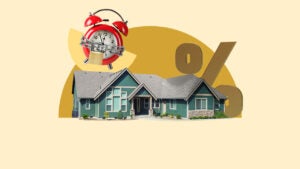How can I sell my house fast in Virginia?

Whether you own a property in Norfolk or Norton, it could be a great time to sell sell your house in the Old Dominion state. Median sales prices here have jumped more than 8 percent from last year, according to February data from Redfin. However, while that might mean a profitable sale, it doesn’t necessarily mean a quick sale. Read on for information and tips on how to sell your home fast in Virginia.
How fast can I sell my house in Virginia?
If you are ready to sell your Virginia home, you may have to be patient. Properties here spend a median of 36 days on the market before going into contract, per Redfin, and after that you typically have to wait several more weeks for the buyer’s financing to be finalized.
While that’s actually a lower days-on-market figure than the national median of 48 days, it still means it takes more than a month, or possibly even more than two, to close a home sale in the traditional way.
Need to sell faster?
It’s possible to sell your Virginia home much faster if you’re open to more non-traditional selling methods. If you are in a hurry — you’re relocating for an unexpected job opportunity, for example, or you need the cash ASAP — here are some ways to speed up the process:
- Sell to a homebuying company: Cash-homebuying companies move with amazing speed, buying homes directly from the owners in all-cash deals that can typically close within a few weeks, or sometimes even a few days. Virginia has national franchises, including We Buy Houses and HomeVestors, as well as a multitude of local homebuying firms. While they all move fast, keep in mind that they will pay less for your home than you would likely get in a traditional listing process.
- Sell to an iBuyer: An iBuyer works similarly — they make you a quick cash offer using an online algorithm. One of the biggest, Opendoor, buys homes in the Richmond and suburban Washington, D.C. areas.
- Sell during prime season: If you are able to time your sale, listing your home in spring or early summer will typically mean a faster sale. Redfin data shows that Virginia properties spent just 19 days on the market in May and June, as opposed to 36 days in February.
-
Sell with a Realtor: Working with an experienced real estate agent can also help you optimize your listing for a faster sale, as long as you’re clear with them that speed is your top priority. They can recommend marketing strategies to push the timeline faster, like pricing lower than other similar homes in the area or offering seller concessions.
Sell your home fast for fair market value
If you decide to go with the traditional listing process, it’s a good idea to know the local market in your area of Virginia. A local listing agent will help you understand the market value of your home and how it fits into the local housing landscape. Discuss the following topics with them:
How should you price your listing?
An agent can help you determine how much your home is worth, and how to price the listing so that it sells quickly. They will look at local comps, or nearby homes similar to yours that have recently sold, to come up with an ideal asking price.
Is it worth upgrading before you sell?
Major projects, like gut kitchen remodels and basement build-outs, mean two things: money and time. Most big home improvement projects do not recoup their full costs when it’s time to sell, and they tend to take longer than you think they will. If you do want to make some changes that can increase your sale price, try quicker, more economical methods instead, like boosting your curb appeal.
What should you fix?
Put yourself in the shoes of a buyer who is touring your home. Are there any glaring issues you would notice? If a shelf is broken, a window is cracked or a coat of paint is chipping, those obvious items should probably be addressed. Ask your agent for advice on what’s worth fixing and what isn’t. If the home needs extensive repairs, you may even want to consider selling it as-is. This means you don’t have to worry about any repairs — however, you will likely sell the home for less, as the buyer will need to cover those costs.
Should you stage your home?
Buyers like to see a house that feels like a home, and the best way to do that is to help them envision actually living there. While hiring a professional stager requires spending a few bucks, it can result in a slightly quicker sale. In a 2023 report from the National Association of Realtors, 27 percent of seller’s agents reported a decrease in time on market for staged homes.
What do you need to disclose to the buyer?
While many states have lengthy disclosure forms with specific questions about potential defects, Virginia sellers instead sign a statement that indicates they “make no representations” about anything in the home, stating “required notice for buyer to exercise necessary due diligence.” You will need to be honest if a buyer asks you a specific question about the property, but otherwise, it’s up to them to pay for a home inspection to identify any problems. In addition, if the property is part of a homeowners association, you should be ready to hand over documents about the bylaws, past meeting minutes and the association’s financial health.
Closing day
Home sellers are responsible for some closing costs before the deal is done. Your biggest expense as a seller is likely to be real estate agent fees (though the way these commissions are paid will be changing this summer). As things currently stand, the seller usually pays the commission for both the their own agent and their buyer’s agent. That typically comes to around 5 or 6 percent of the home’s sale price — on a $350,000 home sale, 5 percent comes to $17,500.
Here are some other closing costs Virginia sellers might be required to pay:
- Grantor tax: The buyer covers most transfer taxes in Virginia, but the seller does have to pay a grantor tax, which in most of the state comes out to about $1 per $1,000 in home price. Northern Virginia sellers can expect to pay more.
- Title insurance: In Virginia, the homebuyer typically covers this cost as well, so you won’t need to pay anything for title insurance.
- Escrow fees: You may be charged service fees by the company or third party facilitating the funds being held in escrow — these can run several hundred dollars.
- Attorney fees: You’re not required to hire an attorney for a Virginia home sale. However, it’s a complex transaction with a lot of money on the line, so it’s smart to have a lawyer looking out for your interests anyway.
- Capital gains tax: Depending on how much you make on your home sale, you may have to pay the IRS capital gains tax on the profits. This depends on other factors as well, including how long you lived there, whether it was your primary residence and your marital status — consult a tax professional if you’re not sure.
Next steps
If speed is your top priority, look into homebuying companies in your area to see how much they are willing to offer for your property. They will be able to close a deal faster than a traditional sale route could. But if you want to maximize your profits, your best bet is to find a local real estate agent who knows your area of Virginia inside-out. Experienced agents will know what buyers are looking for right now, and they will be able to help you strategize a quicker home sale for the best price possible.
FAQs
-
The fastest way to sell your home in Virginia is likely to be working with a cash-homebuying company. Many can make you an offer almost instantly and close the sale in just a couple weeks, or sometimes even faster. However, you will likely make less money using this method than you would if you sold on the market with a real estate agent.
-
Yes, it is certainly possible to sell your Virginia house without a Realtor. Going it alone is called a for sale by owner (or FSBO) transaction. While this may save you from having to pay a listing agent’s commission, it requires quite a lot of work on your part. And if you do decide to sell without an agent, it’s even more important to have real estate attorney go over all your paperwork to make sure it’s in order.
Why we ask for feedback Your feedback helps us improve our content and services. It takes less than a minute to complete.
Your responses are anonymous and will only be used for improving our website.
You may also like

How to protect your home from porch pirates during the holiday season

What is a fixed-rate mortgage?




